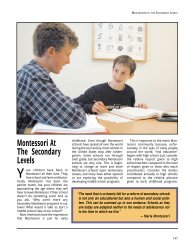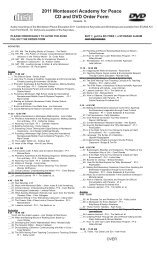Tim Seldin & Paul Epstein Ph.D. An Education for Life
Tim Seldin & Paul Epstein Ph.D. An Education for Life
Tim Seldin & Paul Epstein Ph.D. An Education for Life
Create successful ePaper yourself
Turn your PDF publications into a flip-book with our unique Google optimized e-Paper software.
APPENDIXES<br />
In his book, Maria Montessori: Her <strong>Life</strong><br />
and Work, E.M. Standing described the<br />
following characteristics of normalization<br />
in the child between the age of three and<br />
six:<br />
■ A love of order;<br />
■ A love of work;<br />
■ Profound spontaneous<br />
concentration;<br />
■ Attachment to reality;<br />
■ Love of silence and of working<br />
alone;<br />
■ Sublimation of the possessive<br />
instinct;<br />
■ Obedience;<br />
■ Independence and initiative;<br />
■ Spontaneous self-discipline;<br />
■ Joy; and<br />
■ The power to act from real choice<br />
and not just from idle curiosity.<br />
Is Montessori <strong>for</strong> All Children?<br />
The Montessori system has been used<br />
successfully with children from all socioeconomic<br />
levels, representing those in<br />
regular classes as well as the gifted, children<br />
with developmental delays, and<br />
children with emotional and physical<br />
disabilities.<br />
There is no one school that is right<br />
<strong>for</strong> all children, and certainly there are<br />
children who may do better in a smaller<br />
classroom setting with a more teacherdirected<br />
program that offers fewer choices<br />
and more consistent external<br />
structure.<br />
Children who are easily overstimulated,<br />
or those who tend to be overly aggressive,<br />
may be examples of children who<br />
might not adapt as easily to a Montessori<br />
program. Each situation is different, and it<br />
is best to work with the schools in your<br />
area to see if it appears that a particular<br />
child and school would be a good match.<br />
Is Montessori Opposed to Homework?<br />
Most Montessori schools do not assign<br />
homework to children below the elemen-<br />
232<br />
tary level. When it is assigned to<br />
older children, it rarely involves<br />
page after page of “busy” work;<br />
instead, the children are given<br />
meaningful, interesting assignments<br />
that expand on the topics<br />
that they are pursuing in class.<br />
Many assignments invite parents<br />
and children to work together.<br />
When possible, teachers will<br />
normally build in opportunities <strong>for</strong><br />
children to choose among several<br />
alternative assignments. Sometimes,<br />
teachers will prepare<br />
individually negotiated weekly<br />
assignments with each student.<br />
Is Montessori Unstructured?<br />
At first, Montessori may look unstructured<br />
to some people, but it is<br />
actually quite structured at every<br />
level. Just because the Montessori<br />
program is highly individualized<br />
does not mean that students can do<br />
whatever they want.<br />
Like all children, Montessori students<br />
live within a cultural context<br />
that involves the mastery of skills<br />
and knowledge that are considered<br />
essential.<br />
Montessori teaches all of the<br />
“basics,” along with giving students<br />
the opportunity to investigate and<br />
learn subjects that are of particular<br />
interest. It also allows them the ability<br />
to set their own schedule to a<br />
large degree during class time.<br />
At the early childhood level,<br />
external structure is limited to<br />
clear-cut ground rules and correct<br />
procedures that provide guidelines<br />
and structure <strong>for</strong> three- and fouryear-olds.<br />
By age five, most schools<br />
introduce some sort of <strong>for</strong>mal system<br />
to help students keep track of<br />
what they have accomplished and<br />
what they still need to complete.<br />
Elementary Montessori children<br />
normally work with a written study<br />
plan <strong>for</strong> the day or week. It lists the<br />
tasks that they need to complete,<br />
while allowing them to decide how<br />
long to spend on each and what<br />
order they would like to follow.<br />
Beyond these basic, individually tailored<br />
assignments, children explore<br />
topics that capture their interest and<br />
imagination and share them with<br />
their classmates.<br />
Are There <strong>An</strong>y Tests in<br />
Montessori Programs?<br />
Montessori teachers carefully observe<br />
their students at work. They give<br />
their students in<strong>for</strong>mal, individual<br />
oral exams or have the children<br />
demonstrate what they have learned<br />
by either teaching a lesson to another<br />
child or by giving a <strong>for</strong>mal presentation.<br />
The children also take and<br />
prepare their own written tests to administer<br />
to their friends. Montessori<br />
children usually don’t think of assessment<br />
techniques as tests so much as<br />
challenges. Students are normally<br />
working toward mastery rather than a<br />
standard letter grade scheme.<br />
Standardized Tests: Very few Montessori<br />
schools test children under the<br />
first or second grades; however, most<br />
Montessori schools regularly give elementary<br />
students quizzes on the concepts<br />
and skills that they have been<br />
studying. Many schools have their<br />
older students take annual standardized<br />
tests.<br />
While Montessori students tend to<br />
score very well, Montessori educators<br />
are deeply concerned that many<br />
standardized tests are inaccurate,<br />
misleading, and stressful <strong>for</strong> children.<br />
Good teachers, who work with the<br />
same children <strong>for</strong> three years and<br />
carefully observe their work, know far<br />
more about their progress than any<br />
paper-and-pencil test can reveal.<br />
The ultimate problem with standardized<br />
tests is that they have often<br />
been misunderstood, misinterpreted,




